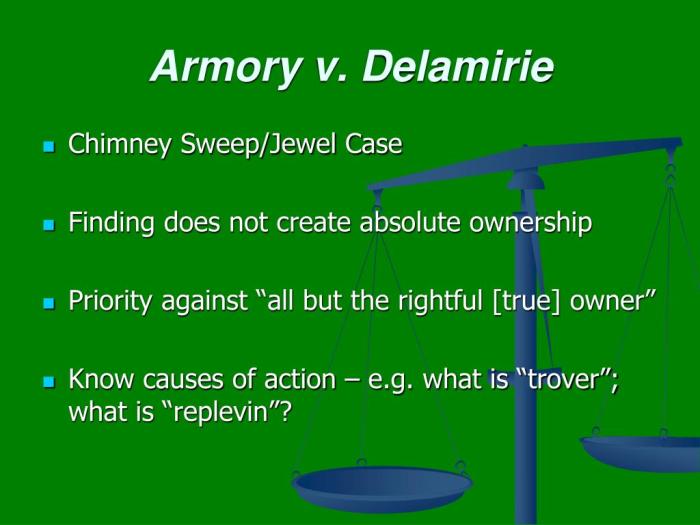Armory v delamirie case brief – Armory v. Delamirie, a pivotal case in the annals of common law, stands as a beacon of legal principles governing the rights of finders. This case brief delves into the intricacies of the case, exploring its historical significance, legal implications, and enduring relevance in modern legal contexts.
The case revolves around a chimney sweep’s serendipitous discovery of a valuable jewel within a discarded piece of paper. As the legal battle ensued, the courts grappled with fundamental questions of property rights and the responsibilities of finders. The outcome of Armory v.
Delamirie established a precedent that continues to shape legal discourse today.
Case Overview

The Armory v. Delamirie case is a landmark English common law case that established the principle of “finders keepers,” subject to the rights of the true owner.
In 1722, a chimney sweep’s apprentice named James Armory found a jewel encrusted gold ring while cleaning out a chimney. He took the ring to a goldsmith, Thomas Delamirie, to have it appraised. Delamirie refused to return the ring, claiming it was his property because it had been found on his premises.
Legal Issue
The legal issue in the case was whether the finder of lost property has a right to possess it against the owner of the premises where it was found.
Outcome
The court ruled in favor of Armory, holding that the finder of lost property has a right to possess it against all others, except the true owner. The court reasoned that the finder has a better right to the property than the owner of the premises, who has not taken any steps to possess it.
The Armory v. Delamirie case brief highlights the legal principle of finders’ rights. It established that the finder of a lost item has a right to possession against all but the true owner. In a similar vein, Ana Nzinga , the 17th-century Queen of Ndongo and Matamba, fought for the rights of her people against Portuguese colonizers.
Her leadership and determination echo the principles of possession and ownership explored in Armory v. Delamirie.
Legal Principles Established

The Armory v. Delamirie case established several important legal principles, including the concept of “finders keepers” and the duty of a finder to take reasonable steps to locate the true owner.
The “finders keepers” principle holds that a person who finds lost or abandoned property has the right to keep it, unless the true owner can be found. However, this principle is subject to certain exceptions, such as when the property is found on someone else’s property or when the finder knows the identity of the true owner.
The duty of a finder to take reasonable steps to locate the true owner is based on the principle of good faith. A finder who knows or has reason to know the identity of the true owner must make reasonable efforts to return the property to its rightful owner.
This duty is not absolute, however, and a finder is not required to spend an unreasonable amount of time or money in trying to locate the owner.
Reasonable Steps to Locate the True Owner
The steps that a finder must take to locate the true owner will vary depending on the circumstances of the case. In general, however, a finder should make a reasonable effort to:
- Identify the owner of the property, if possible.
- Contact the owner directly, if possible.
- Advertise the property in a local newspaper or online.
- Turn the property over to the police or other authorities.
If a finder takes reasonable steps to locate the true owner but is unable to do so, the finder may be able to keep the property. However, if the true owner later comes forward and proves their ownership, the finder may be required to return the property or its value.
Impact on Common Law

The Armory v. Delamirie case had a significant impact on the development of common law, particularly in relation to the law of property and the rights of finders.
Prior to this case, the common law did not provide clear rules regarding the rights of finders. In particular, it was unclear whether a finder had a right to keep property that they had found, or whether the property automatically belonged to the owner of the land on which it was found.
Rights of Finders
The Armory v. Delamirie case established the principle that a finder has a right to keep property that they have found, even if the owner of the property is unknown. This principle has been applied in subsequent cases to a wide range of situations, including cases involving lost property, abandoned property, and treasure trove.
The Armory v. Delamirie case also established the principle that a finder has a duty to take reasonable steps to locate the owner of the property. If the finder fails to take such steps, they may be liable for conversion.
Law of Property
The Armory v. Delamirie case also had a significant impact on the law of property. Prior to this case, the common law did not provide clear rules regarding the rights of owners of lost and abandoned property.
The Armory v. Delamirie case established the principle that the owner of lost property has a right to recover the property from the finder. This principle has been applied in subsequent cases to a wide range of situations, including cases involving lost jewelry, lost luggage, and lost pets.
Relevance to Modern Law: Armory V Delamirie Case Brief

Armory v. Delamirie continues to be a relevant legal precedent in modern law, shaping cases involving lost or stolen property, intellectual property, and digital assets.
In the context of lost or stolen property, the principle of Armory v. Delamirie establishes that the finder of lost property has a right to possession against all but the true owner. This principle has been applied in numerous modern cases, including those involving abandoned vehicles, lost jewelry, and even abandoned pets.
Intellectual Property
The principles of Armory v. Delamirie have also been applied to cases involving intellectual property. For example, in the case of Harper & Row, Publishers, Inc. v. Nation Enterprises, the Supreme Court held that the publisher of a stolen manuscript did not have a valid copyright in the work.
The Court reasoned that the publisher did not have a “sufficiently close relationship” with the author to be considered the “owner” of the copyright under Armory v. Delamirie.
Digital Assets, Armory v delamirie case brief
In the digital age, the principles of Armory v. Delamirie have been applied to cases involving digital assets, such as computer files and software. For example, in the case of MAI Systems Corp. v. Peak Computer, Inc., the Ninth Circuit held that the finder of a lost computer file had a right to possession against all but the true owner.
The court reasoned that the computer file was a “chattel” under Armory v. Delamirie and that the finder had a sufficient interest in the file to maintain a cause of action for conversion.
Historical Significance

The Armory v. Delamirie case unfolded in 18th-century England, a period characterized by significant social and legal transformations.
During this era, England was transitioning from a primarily agrarian society to a burgeoning commercial and industrial hub. This shift brought about a rise in urban populations, increased trade, and the expansion of property ownership.
Legal Landscape
The legal landscape of 18th-century England was heavily influenced by the principles of common law, which had been developing over centuries through judicial decisions.
- Common law placed great emphasis on the rights of property owners and the sanctity of possession.
- However, the law also recognized the need to balance these rights with the interests of finders and other parties who might come into possession of lost or stolen property.
Expert Answers
What is the “finders keepers” principle?
The “finders keepers” principle is a common misconception that does not accurately reflect the legal principles established in Armory v. Delamirie. The case held that finders have a duty to take reasonable steps to locate the true owner of lost property.
What are the legal implications of Armory v. Delamirie?
Armory v. Delamirie established the legal principle that finders have a right to possession of lost property until the true owner is found. However, finders also have a duty to take reasonable steps to locate the true owner and return the property.
How does Armory v. Delamirie apply to modern legal contexts?
The principles established in Armory v. Delamirie continue to be applied in modern legal contexts, including cases involving lost or stolen property, intellectual property, and digital assets. Courts often refer to the case to determine the rights and responsibilities of finders in various situations.
